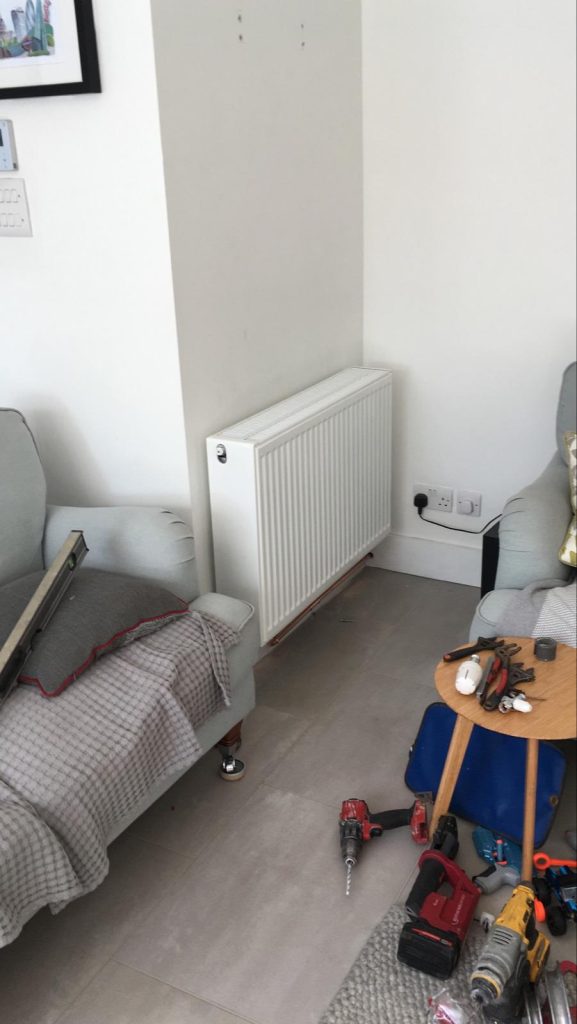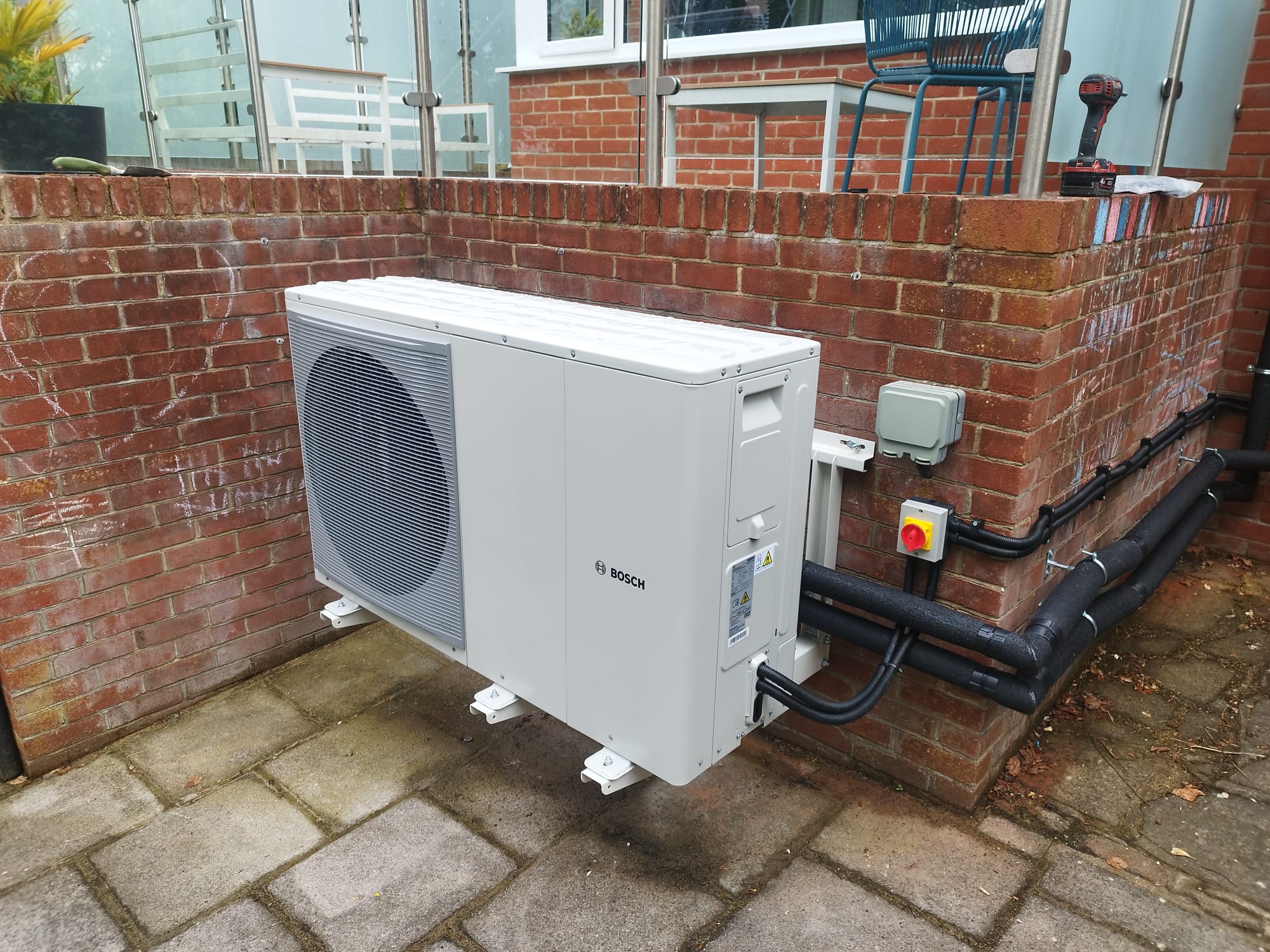As more homeowners in the UK explore renewable heating solutions, heat pumps are becoming an increasingly popular choice.
One of the most common questions we get asked when visiting customers is “Do heat pumps work with existing radiators?
The good news is that heat pumps can be integrated with your current radiators, but there are a few important considerations to bear in mind.
After installing hundreds of heat pump systems across the country, I’ve seen what works and what doesn’t. In this post, I’ll explain how heat pumps function with radiators, whether you’ll need to make any adjustments, and what you can expect in terms of performance and efficiency.
How Do Heat Pumps Work?
Before diving into compatibility with radiators, it’s useful to understand how heat pumps work. A heat pump operates differently from traditional gas or oil boilers.#
Instead of generating heat by burning fuel, a heat pump extracts heat from the outside air (air source heat pumps) or ground (ground source heat pumps) and transfers it into your home.
This process works at lower temperatures compared to conventional boilers, which means heat pumps deliver steady, gentle warmth rather than the quick, high-intensity heat many are used to with a boiler.
The key to making this work efficiently is in how the heat is distributed throughout your home—and that’s where radiators come in.

Can Heat Pumps Work with Existing Radiators?
Yes, heat pumps can work with existing radiators, but it depends on several factors, such as the size of your radiators, the type of heat pump, and the overall heat demand of your home.
Radiator Size and Output
The biggest difference between heat pumps and traditional boilers is the temperature at which they operate.
While a gas boiler might heat water to around 70-80°C, a heat pump typically operates at a lower temperature, around 35-55°C.
This means that your radiators need to be able to distribute this lower-temperature heat effectively.
To compensate for the lower water temperature, larger radiators or more efficient radiators may be needed.
In homes with smaller or older radiators, the heat output might not be sufficient to maintain a comfortable temperature throughout your home.
The existing radiators may need to be upgraded to larger models to provide adequate heat for the space.
I’ve seen many older homes where the original single-panel radiators simply weren’t up to the job of working efficiently with a heat pump.
However, in most modern homes built within the last 20 years, the existing radiators are often perfectly adequate.
Do You Always Need Larger Radiators?
Not necessarily. In many cases, your current radiators might be perfectly suitable, especially if your home is well-insulated. Older or draughty homes might require larger radiators to make the most of the lower-temperature heat provided by the pump. However, if your existing radiators are already sized correctly, they could work well with a heat pump system.
From my experience, about 60% of homes I visit for heat pump installations can use most of their existing radiators, while maybe replacing a few in key areas like living rooms or bathrooms where more heat output might be needed.
More information regarding radiator upgrades can be found on the Heat Geek website.

Types of Radiators That Work Best with Heat Pumps
If your current radiators need to be upgraded, there are several types that work well with heat pumps:
1. Low-Temperature Radiators
These are specifically designed to operate efficiently at the lower water temperatures produced by heat pumps. They offer a larger surface area and greater output, making them ideal for pairing with a heat pump system.
I’ve installed these in many older properties, and they make a massive difference to the system’s overall efficiency.
2. Double or Triple-Panel Radiators
For homes that need more heat output but don’t want to install larger radiators, double or triple-panel radiators are a good option. These radiators have more surface area for heat exchange, meaning they can provide more warmth at lower temperatures.
These are often my go-to recommendation for homeowners who are concerned about aesthetics but still need increased heat output.
Will a Heat Pump Be Less Efficient with Existing Radiators?
In some cases, using existing radiators without upgrading them could lead to lower efficiency. Heat pumps are most efficient when the water temperature is kept as low as possible, which means larger radiators or more efficient heat distribution will help keep running costs down.
If your current radiators aren’t large enough to cope with the lower flow temperature, your heat pump will need to work harder to heat your home, leading to higher energy use. That said, even with the existing setup, heat pumps are generally more efficient than traditional gas or oil boiler installations, so you’re likely to see energy savings either way.
How to Determine if Your Radiators are Suitable
To determine if your existing radiators are compatible with a heat pump, it’s worth consulting with a professional installer. A qualified heating engineer can assess:
- The size and output of your current radiators
- The heat demand of your home
- The insulation levels in your property
They’ll use this information to calculate whether your radiators need to be upgraded or if they’re sufficient for your home’s heat requirements. It’s also important to take into account that some rooms in your home may need larger radiators, while others may be fine with the current setup.
A comprehensive heat loss survey is the best way to get an accurate assessment of your home’s heating needs before making any decisions.


No responses yet